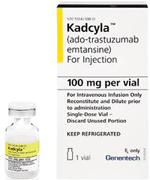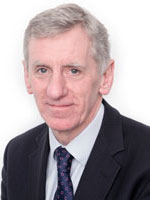 Back in April, the U.K.'s price watchdog, the National Institute for Health and Care Excellence (NICE), declared that Roche's ($RHHBY) much heralded breast cancer treatment Kadcyla was too expensive, threatening to recommend that the country's health system refuse to pay for the drug. Roche spent the next several months urging NICE to change course, even offering to cut the price of the drug. But that wasn't enough: NICE has issued its final draft guidance, which declares the drug is too expensive to cover.
Back in April, the U.K.'s price watchdog, the National Institute for Health and Care Excellence (NICE), declared that Roche's ($RHHBY) much heralded breast cancer treatment Kadcyla was too expensive, threatening to recommend that the country's health system refuse to pay for the drug. Roche spent the next several months urging NICE to change course, even offering to cut the price of the drug. But that wasn't enough: NICE has issued its final draft guidance, which declares the drug is too expensive to cover.
The decision has breast cancer patients and advocacy groups in the U.K. blasting NICE for barring access to a drug that can provide hope to people who have run out of treatment options. Kadcyla (trastuzumab emtansine) is an antibody-drug conjugate for treating HER2-positive breast cancer that has spread and is unresponsive to other treatments. The drug has been embraced in the U.S., where more than 80% of oncologists started prescribing it within its first 9 months on the market.
"I'm a mum of four children. This is a fast-spreading disease," breast cancer patient Hayley Kalinins told the BBC, according to The Courier. She urged NICE to work harder to bring the drug to the U.K.'s health service. "This is the wonder drug. We need this." Mia Rosenblatt, head of policy and campaigns at the London-based Breast Cancer Campaign, told The Courier it is "vital that this is not the end of the line for Kadcyla" and that Roche and NICE should be working together to resolve the pricing dispute.
In a statement, NICE explained that it had made its determination based on the cost per "quality-adjusted life year" (QALY) of Kadcyla. Generally if a treatment costs more than £30,000 ($50,415) per QALY, NICE would not recommend it, and the agency determined that the cost per QALY of Kadcyla is £166,000 ($278,963).
 |
| NICE CEO Sir Andrew Dillon |
"Although Roche proposed a discount to the full list price of Kadcyla, it made little difference to its value for money, leaving it well above the top of our specially extended range of cost effectiveness for cancer drugs," said NICE CEO Andrew Dillon in the statement. "We are really disappointed that Roche were not able to demonstrate more flexibility to help us provide a positive recommendation."
Roche says in press statements that it plans to appeal NICE's decision. "Refusing patients access to this drug is an incredible injustice and tantamount to turning the clock back in cancer R&D," Jayson Dallas, a Roche general manager, told PharmaTimes. The rejection, he added, "demonstrates quite simply that their current system is broken, not fit for purpose and in need of a complete overhaul when it comes to advanced cancer."
NICE's decision came just one day after Roche barely squeaked by the U.K. price watchdogs with another cancer drug, Tarceva, for the second-line treatment of non-small cell lung cancer. NICE rejected AstraZeneca's ($AZN) rival drug, Iressa, for second-line treatment but declared that Tarceva could still be used in some circumstances.
Just how big the impact of NICE's decision will be on Kadcyla remains to be seen. Some patients in England will be able to gain access to the drug through that country's Cancer Drugs Fund. And the product continues to be a runaway hit elsewhere: Sales of Kadcyla, which was approved by the FDA last February and the EU 6 months later, skyrocketed 188% in the first half of this year to 227 million Swiss francs ($250.3 million).
- here's the NICE statement
- read more at The Courier
- here's PharmaTimes's take